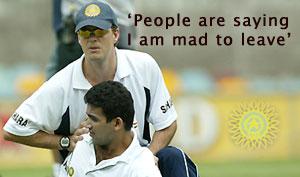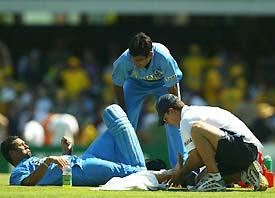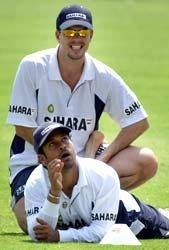 | « Back to article | Print this article |

Andrew Leipus changed the way a generation of Indian cricketers viewed the game. From a time when one couldn't find a bandage in the Indian dressing room's first-aid kit to a point where India's top cricketers don't need to be coaxed into training in the gymnasium, the Aussie made an impact on the nation's standing in the game.
The 34-year-old physio began his stint with Indian cricket in 1999 and signed off at the fag end of 2004 after the tour of Bangladesh.
Before leaving for Adelaide, where he will update himself on the latest advances in physiotherapy, Senior Cricket Correspondent Ashish Magotra caught up Leipus to review the five years he spent with the Indian team for a major interview, the first part of which we publish today:
Five years with the Indian team is a long time. Now, at the end of that period, what exactly is going through your mind?
Many things. Like what am I doing, why am I leaving, especially when I have been offered a contract right up to the 2007 World Cup in the West Indies. I think the boys have got it in them; Indian cricket has got the capability of making the final once again if not get the trophy. I'd love to have another go at the World Cup.
I am leaving a family. We had good inter-personal relationships; good bonding existed in the team. I am leaving all that to go and pursue something else. It is a scary change. A lot of people are saying I am mad to leave, but it is just something I have to do.
 I remember you saying that the first time you entered the Indian dressing room you couldn't even find a Band-Aid in the first aid kit. What are the qualities you think your replacement will need most?
I remember you saying that the first time you entered the Indian dressing room you couldn't even find a Band-Aid in the first aid kit. What are the qualities you think your replacement will need most?
He must have a lot of experience to carry off from where we are right now. There is a better support network now than there was earlier. John Wright is here; Gregory King is here and, obviously, there is a good network of young physios coming up on the domestic level.
I think experience is very, very important. It can't be someone who is a new graduate. It has got to be someone who will take the guys to the next level.
Understanding of the game of cricket, the demands on a sportsman's body, interacting with the team you have to be sensitive to the needs of the players and their bodies. The coach also has his traits. Obviously, he is under a lot of stress. So you have to try and get along with everyone.
In India, cricketers are like gods to a lot of people. They are certainly a lot bigger, at least personality-wise, than in any other cricketing nation. Does that make a difference to the way they deal with you or the way you deal with them?
At first it was a little bit intimidating to come from first class cricket and start working with these boys. But, then, when I say you need an experienced hand, that person will realise that these guys are just sportsmen. At the end of the day they get a lot of financial benefits and have a lot of status; but when it comes down to the crunch, they are just like you and me; just that they are highly skilled in what they do. If you are doing your job, it shouldn't matter who they are.
How does a physio deal with the media glare?
I think that is one issue you can never really prepare yourself for. I know the media have got their job to do; that's how the players make their money through endorsements and the attention they get. It is tough at times.
There are certain things that we don't want people to know for various reasons, whether it is gamesmanship or whether it is a personal medical problem that doesn't need to be advertised. But we respect the fact that the media is doing its job. Sometimes it works in our favour.
For example, Ashish Nehra's ankle injury during the World Cup received huge attention and there was intense speculation about whether he would play or not. We managed to get him fit and he won the match (against England, Nehra claimed 6 for 23) for us. Most importantly (grinning), I looked good!
After five years with the team do you believe that the Indian physique actually differs from that of the Australians?
I originally thought there wasn't a significant difference. But after being with the team for five years I think it would be silly to suggest there isn't one. The reasons are, of course, genetics; there are also other factors such as diet, exposure to conditioning from other sports.
The Aussies are always exposed to rugby, football (Australia Rules), so they are generally a lot bigger than their Indian counterparts. The diets there are generally all completely non-vegetarian while it is predominantly vegetarian over here (in India).
But then, cricket is a skill game. Never forget that it is a skill game first and the fitness just allows you to exhibit those skills in a better way and for a lot longer. The Indian physique is generally a lot more flexible and lighter, and that in turn allows them to put more wrist action in their shots.
Give us an example to illustrate how much things have changed during your tenure with the team.
Probably the easiest thing to monitor during the season -- remember we are playing almost 10 months a year -- is body composition; the ratio of body fat to lean body mass. That is the function of energy in and energy out. We monitor what they are eating.
I think over a period the guys have paid more attention to what they eat and that has resulted in lighter bodies and that means you are carrying a lot lesser weight around the park and that effectively means you are fitter.
Flexibility hasn't changed a lot; strength has.
In the beginning I had to push them into the gym; that doesn't happen now. They have a lot more sessions each week that they have to complete. They have a lot more stability (development of trunk control to stabilize the back, the pelvis and the shoulders) and they are compliant.
 Almost everyone in the world knows that Yuvraj (Singh) and (Mohammad) Kaif are very fit. But fitness is mainly of three types, namely endurance, strength and flexibility. If you had to pick these three areas, who is the fittest?
Almost everyone in the world knows that Yuvraj (Singh) and (Mohammad) Kaif are very fit. But fitness is mainly of three types, namely endurance, strength and flexibility. If you had to pick these three areas, who is the fittest?
Actually there are a lot more areas, but people tend to generally identify with those main ones.
Strength: Probably Irfan Pathan is one of the strongest in the team.
Flexibility: Dinesh Karthik is very flexible. For that matter, all wicketkeepers are very flexible.
Speed and endurance: It has to be Kaif.
Overall speed: I think Yuvraj is pretty quick.
Everyone has strengths and weaknesses, but it is about the complete package. It is not about individual traits. We try and focus on the weaknesses. Many people have natural ability in one particular area and we try to work on the weaknesses and create a balanced player.
Yuvraj, for example, is not a very flexible player, so we don't work a lot on his speed but more on his weakness. Everyone is worked on an individual basis.